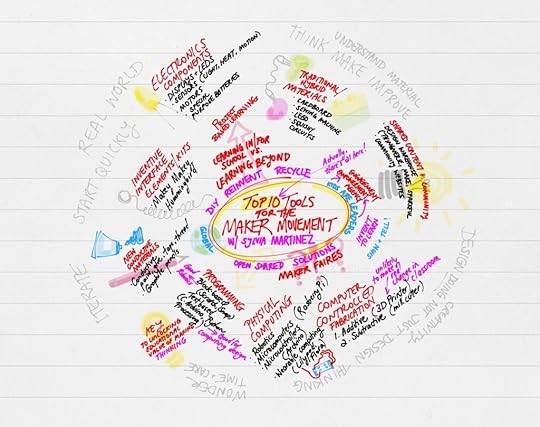Sylvia Libow Martinez's Blog, page 18
April 15, 2014
FabLearn Fellows 2014
I’m pleased to announce that I’ll be formally working with the first cadre of FabLearn Fellows as a mentor and advisor.
This program is a part of aNSF-sponsoredproject entitled“Infusing Learning Sciences Research into Digital Fabrication in Education and the Makers’ Movement.” The 2014 FabLearn Fellows cohort is a diverse group of 18 educators and makers. They represent eight states and five countries, and work with a wide range of ages at schools, museums, universities and non-profits.They ha...
March 18, 2014
Measuring Making
One of the most common questions people ask me is “How do we measure the success of our maker program?” We cover this in our book, Invent To Learn: Making, Tinkering, and Engineering in the Classroom. However, I think there are more details that I can help with.
This is different than assessing student learning in specific subjects. I touched on assessment of maker projectsin this blog post and hope to talk more about this soon. But what I’m going to talk about in this post is how to show that...
March 9, 2014
What if… those helpful instructions aren’t so helpful
My last post linked to a video showing Dr. Paulo Blikstein of Stanford University showcasing the research going on in his department regarding how making becomes learning.
The next question is what to do when faced with early research? Do we just wait until the research is done? Or maybe even validated with other studies?
I don’t believe this.
I want to know, “What if these early findings are true? Would it change my practice? What would it look like in my classroom or school?”
Let’s just take on...
February 21, 2014
Video – New Research Seeks to Find Out How Making Becomes Learning
One of the questions we consistently get in our sessions and workshops is about assessment. How do we know what kids are learning if there is no written test? Is this maker stuff more than just a new fad? While there are traditional ways that projects can be assessed (such as teacher observation techniques,) there is new research going on at Stanford in Dr. Paulo’s Blikstein’s Transformative Learning Technologies Labthat is starting to answer these questions. This video is a terrific overview...
February 19, 2014
A Graphic Vision of Maker Movement Tools
The talented Cathy Hunt created this lovely piece of art during my session at Learning 21c in Hong Kong.
Webinar archive – Why Schools Should Know About the Maker Movement
This is the video archive of a webinar hosted by Atomic Learning as part of a series called, “Education Eavesdrop”.
Education Eavesdrop Why School Leaders Should Know About the Maker Movement from Atomic Learning on Vimeo.
February 18, 2014
Educon session video – MakerEd Design Sprint
This is the video of the Educon 2014 session “MakerEd Design Sprint”. Unfortunately, it’s not very good audio or video. The first ten minutes or so are hard to hear, and then when we move into the actual working part of the session, there is not much to watch. Everyone there was working in small groups and sharing their ideas.
The website where we collected the group work (lesson ideas and prompts) is here: K12makers.org
February 10, 2014
Self-esteem and me (a girl) becoming an engineer
People often say to me, “You must have had great self-esteem when you were a kid to become an engineer, such a male-dominated profession.”
But no, that’s not true at all.
It’s not like I thought I was a bad person, it’s just that I never had much “self” anything. I was not a self-aware kid. Social and emotional situations were not my thing. There were lots of things going around me that I completely missed.I never got involved in what the kids today call “drama”, not out of any sort of good ins...
January 23, 2014
Precision is precious
This article3D PRINTING AND LEGOS:PERFECT TOGETHERis a great example of an engineering principle that says that you should only be precise where precision is necessary. Unnecessary precision is a waste of time, money, and resources. The article shows a prototype of a pair of goggles, where precision is needed for the areas holding the lenses. So they used a combination of the Legos (cheap, easy to work with, and abundant – but not easily modified) and 3D printed pieces (takes longer to make e...
December 26, 2013
Making is a stance toward learning – interview by Howard Rheingold
Howard Rheingold (yes, THE Howard Rheingold) invited me to join him for a web broadcast, so of course I said yes! Here’s the video capture.
Howard also said,
“Making and building projects that personally interest students and an iterative design process don’t mean that teachers’ guidance becomes less necessary. A good corollary to “education is an igniting, not a pouring,” is “without banks, a stream would be a lake.” Teachers are there more to show students how to learn than to instruct them,...




